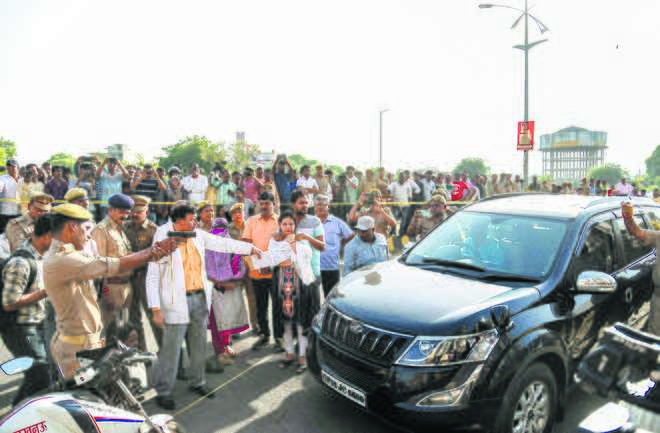
Grisly incidents like the killing of an innocent man by the UP Police erode public trust.
Vikash Narain Rai
Former Director, National Police Academy, Hyderabad
TWO recent police killings during public contact situation have shaken the trust of public in policing and further compromised the downward legitimacy graph of the law and order machinery. In Lucknow, senior company executive Vivek Tiwari was shot by a two-member stop and search team of the local police; whereas in Gurugram, the lone PSO attached to a judicial officer shot at his wife (who succumbed to injuries) and son while escorting them at a shopping centre. The attackers remained defiant after committing crime in both episodes.
Prima facie, they appear to be acts of violence committed under a fit of aggression. In a classic pattern of similar violence committed under a spell of depression, the attacker would have attempted to harm himself as well at the end of the shooting sequence. Both incidents indicate serious procedural shortcomings on part of the respective police departments. From a policy perspective, lack of normative commitment to constitutional values is evident.
The attackers were assigned to defend the victims from the kind of perpetrators they themselves turned out to be. Their gun skill was controlled by their authoritative notion of self-righteousness, which they perceived was challenged by the victims. Human resource, the biggest professional resource of the police, needs tough ethics. The equation between power and police, however, entrusts this very human resource to the manipulation of compromised managers.
There are immunising precedents, too. In UP, since Yogi’s ascendency, almost hundred killings have been reported in the name of crime control at the hands of the police, without even one being probed by an independent agency. Similarly, since the present BJP government took over in Haryana, the state has seen two extremely inept handling of law and order situations, which had to be compensated by reckless military firings resulting in over three dozen deaths of civilians in each phase. There were inquiries but no lessons.
Nothing concrete has come out of the two police homicides. In UP, the present DGP was imported from the CISF and is required to match Yogi’s tough crime control profile with enough encounters, while in Haryana, the incumbent is serving on extended contract.
The Haryana Police has not come out with any comprehensive statement on the shameful Gurugram tragedy as it did not rattle its political bosses. It would like to pass it off as an individual member’s loss of momentary control. Neither has the UP Police. However, since the Lucknow incident rattled the political bosses, the DGP did circulate the following note of regret, explaining the killing as an act of aberration: ‘No amount of apology will suffice for the loss of a precious life, heal the wounds of the devastated family. My heart goes out for the little daughters, wife & family members of late Vivek Tiwari and I share my grief with them. Such deviant, criminal behaviour is reprehensible and deserves the strictest punishment. We are determined to punish & wean out such rogues in uniform who hang our heads in shame, at the same time we have also embarked on systemic reforms through behavioural training & humanisation of the force. It’s an arduous task & neglected for long but it is now on our foremost agenda....’
Here is my take on this farce: if you are just an authority serving powerful masters well, these are brave and timely words indeed! Grossly inadequate and hollow, however, because you are not a ‘just’ authority upholding rule of law as envisaged under the Constitution. Under the present political leadership, the UP Police represents an uncontrolled army of vigilante. The IPS leadership is part of this self-destructive bravado. Stop immediately the ongoing drive of moral policing society, under the guise of controlling anti-social elements. The police’s cause will be best served when its working protocols strengthen society by winning its trust and cooperation.
Criminalisation of policing is a shared political legacy in UP. To be fair to him, CM Yogi inherited plenty of broken windows in the popular sense of lawlessness, but in mending them in accordance with his Hindutva agenda, he has unleashed a feudal police regimen amid unprecedented communal and casteist cacophony.
It has never helped police leaders to ignore a crucial factor that it is the normative commitment to their lawful protocols that matters in winning the trust of people and not the loyal display of end justifies the means initiative. When your professional orientations are flawed, any number of moral overtones will have little impact on the outcome.
To start with, blatant authorisation of stop and check, questioning and arresting by the police without quantifiably legitimate basis needs to go. A shift from the personal security regimen to a community security regimen is overdue. In spite of the politician’s yoke on its aching shoulders, the police can adapt to this absolute minimum standard of public accountability. It needs serious training in constitutional conditioning and legitimate policing.
These two tragic episodes have the potential of challenging the prevailing statistical vision of policing. Ironically, in the land of our erstwhile colonial masters they are moving in the direction of policing by consent whereas we are still busy cementing the old framework of policing by authority. Instrumental effectiveness, and not fair policing being the central theme, police modernisation schemes are in essence schemes of militarisation and, consequently, the police regulations are strengthening regimentation of policing rather than democratisation. The real challenge is the absence of public trust. Till there are signs of a ‘just’ authority in sight, any review works only as an awkward stroke of gamesmanship.



























